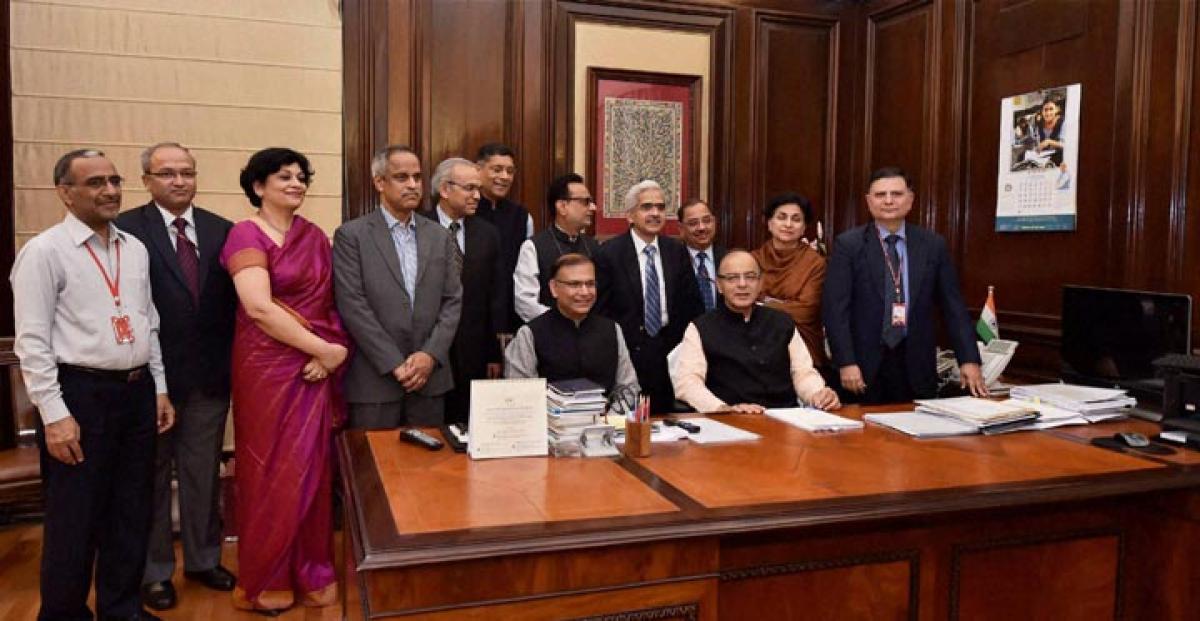Live
- Oxford Grammar High School Celebrates 44th Annual Sports Day with Grandeur
- Indian banking sector’s health remains robust, govt policy working very well: Top bankers
- iOS 18.2 Unveiled: New Features with ChatGPT Integration Revolutionize Your iPhone
- 'Run for Viksit Rajasthan' to be annual event, says CM Sharma
- Nitish Kumar launches '109 free medicine vehicles' in Patna
- India have to play their best cricket at the Gabba to win series: Harbhajan
- Income tax refunds jump 46.3 pc to Rs 3.04 lakh crore in April-Nov
- Financial Intelligence Unit detects undisclosed income worth Rs 11,000 crore in 2024: Centre
- Odisha BJP chief to be elected in January
- AP Home Minister Anitha alerts officials amid rains in heavy Rains in Tirupati
Just In

x
Highlights
The Union Budget document is a compendium mostly of economic and fiscal measures, tax proposals, allocations and policy instruments.
Jaitley may Target Growth, Reforms
New Delhi: The Union Budget document is a compendium mostly of economic and fiscal measures, tax proposals, allocations and policy instruments. The budget speech is an opportunity for the finance minister to unveil an economic policy vision going beyond balance sheet of revenue and income. The economic survey already presented to Parliament gives the broad direction in which Finance Minister Arun Jaitley is expected to make his budget proposals.
- The corporate sector both domestic and foreign looks for key reform measures in the budget speech. The survey has expressed concern over approval of the GST Bill being elusive so far, the disinvestment programme falling short of targets and the next stage of subsidy rationalisation being a work-in-progress. The Finance Minister cannot make anything more than a fervent appeal for GST but concrete action is expected on roll back of more subsidies. This would impact the cost of services and products for the people. Similarly, he would perhaps come out with more ambitious programme for disinvestment in Central PSUs.
- Corporate and bank balance sheets remain stressed affecting the prospects for reviving private investments. We have to see what path the FM would embrace to address this serious problem of improving corporate profitability to kick start the economy. Will he shower more sops for the industry by addressing the problem from supply side or will he put more income in the hands of the people through demand management.
- Will he contend only with more measures towards doing business with ease?
- The survey emphasises that the key to creating a more captive environment will be to address the exit problem which affects the Indian economy. Besides, he would have to take a call on the controversial subject of labour reforms.
- The Indian economy is often described as haven of economic stability during the period of continuing global recession. But, its human development record continues to be alarming. The survey calls for major investments in health and education of people to exploit the country’s demographic dividend to optimal extent. To what extent will this reflect in Budget estimates is to be seen?
- The Economic Survey says that India cannot afford to neglect its agriculture. The country is passing through an acute agrarian crisis. The FM has to take bold measures to revive the sagging agriculture economy to achieve the targeted 8 to 10 per cent growth rate.
- The budget and economic policy will have to contend with an unusually challenging and weak external environment. One tail risk scenario that India must plan for is a major currency re-adjustment in Asia in the wake of a similar adjustment in China. Another tail risk scenario could unfold as a consequence of policy actions, to say, capital controls taken to respond to curb outflows from large emerging market countries, which would further moderate the growth, the survey said. Indian rupee is already under severe stress. Exports are worrisome. The external situation can further worsen if the global oil prices rise. The budget has to address the problem of the adverse impact of external environment on India’s domestic economy.
- Foreign demand is likely to be weak which requires finding and activating domestic sources of demand to prevent the growth momentum from weakening. What measures would the finance minister initiate to trigger domestic demand?
- The government tax revenues are expected to be higher than budgeted levels. Direct taxes grew by 10.7% in the first 9 months of 2015-16 while indirect taxes were also buoyant. This gives an opportunity for the government to increase public investment. Will the government squander away this fiscal muscle through populist spending and tax largesse or will it use the mopped up revenues to allocate more funds for resource starved sectors especially social sector and infrastructure.

Next Story
More Stories
ADVERTISEMENT
© 2024 Hyderabad Media House Limited/The Hans India. All rights reserved. Powered by hocalwire.com







